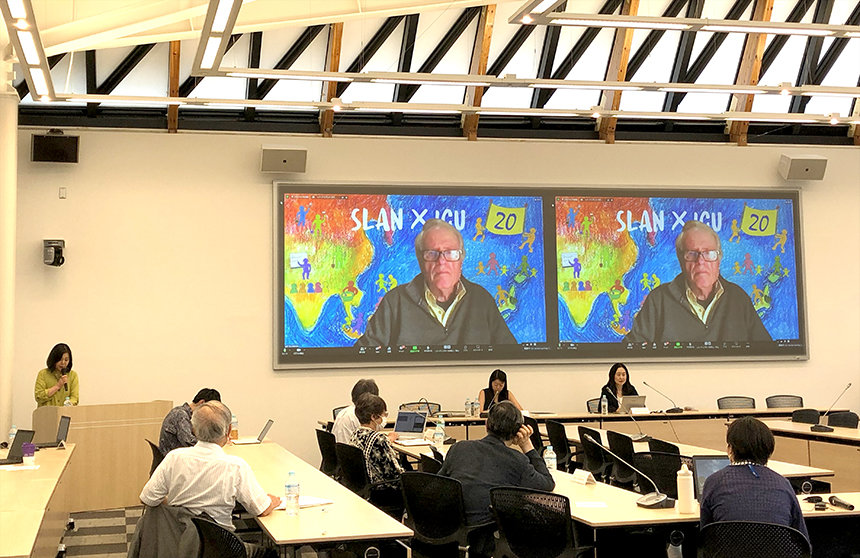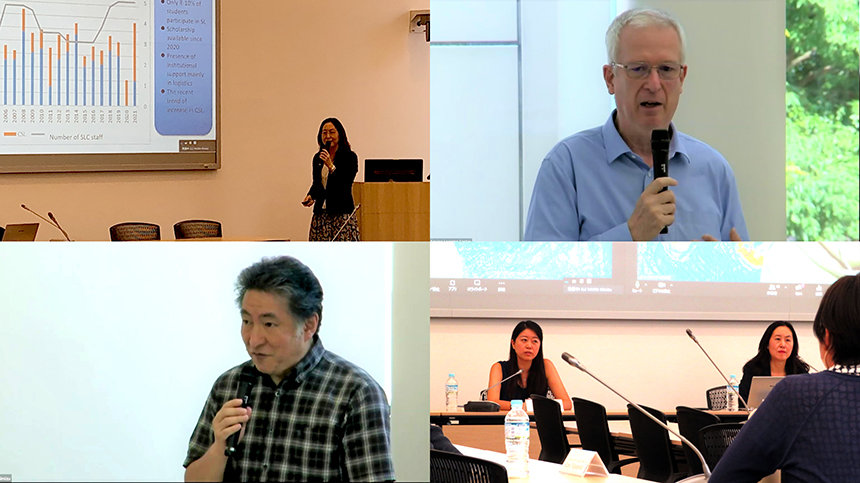International Symposium "The Future of Service-Learning in Asia: Regional Dialogue on Networking" held on campus
Update: July 19, 2022
International Symposium "The Future of Service-Learning in Asia: Regional Dialogue on Networking" was held.
In celebration of the 20th anniversary of the Service-Learning Asia Network (SLAN) and the Service-Learning Center (SLC) of International Christian University, the University held an international symposium on July 2, 2022 at the Kiyoshi Togasaki Memorial Dialogue House in a hybrid format. More than 100 people registered online, and persons related to the university including the past directors and coordinators of SLC gathered at the International Conference Room.
First, President Shoichiro Iwakiri congratulated SLAN on its 20th anniversary, followed by a lecture by Professor Mikiko Nishimura, Director of the Service-Learning Center, on "The Past, Present, and Future of ICU's SL: What we have learned from our networking with partners in Asia". Then, representing East Asia, Southeast Asia, and Southwest Asia, Associate Professor Carol Ma (former SLAN Office, Lingnan University, Hong Kong, now Associate Professor, Singapore University of Social Sciences), Professor Betty McCann (President, Silliman University, Philippines), Professor Mercy Pushpalatha ( (former President, Lady Doak College, India) commented on the future of service-learning in Asia. Also representing other regions, service-learning experts Tim Stanton, former Director of the Haas Center for Public Service at Stanford University, and Florence McCarthy, former Associate Professor at Columbia University and Service-Learning Advisor at International Christian University, offered suggestions for the future. After a question-and-answer session both online and in the audience, Vice President Robert Eskildsen gave closing remarks. The overall moderator was Hitomi Yokote, Service-Learning Coordinator. Online participants included many experts from within and outside the Asian region, and lively discussions took place.

Discussions mainly focused on how to develop service-learning as a network in the future, what can be improved as a pedagogy, and the challenges of institutionalizing service-learning. Future developments include (1) systematic sharing of service-learning experiences in Asia, which have grown and diversified over the past 20 years; (2) joint development and implementation of thematic service-learning programs in Asia; (3) exploring new forms of service-learning in an era of rapid change due to the impact of the COVID-19 and climate change. With regard to teaching methods, the panelists recommended (1) how to ask critical questions personally, academically, and socially in the service-learning process, (2) how to link teaching methods to social impact and social structural issues, (3) the ability to establish ways to develop lifelong learners through the development of a continuous loop of reflection was discussed as critical. In addition, it is important for institutionalization to be linked to the mission of the university, to have multiple types and methods, and to have a general framework that organically links the three social roles of the university: education, research, and social contribution.



